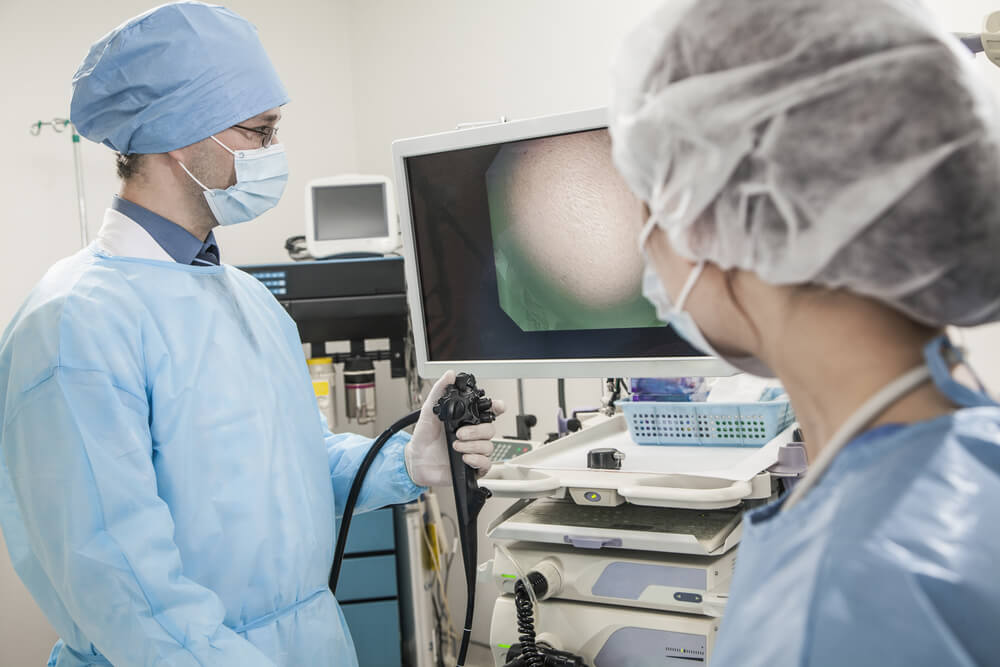
Understanding Endoscopy with Dilation Procedures
If you’re having difficulty swallowing, Rocky Mountain Gastroenterology Associates can help. We perform endoscopy with dilation procedures in Colorado to ease our patients’ pain and address medical issues. Conditions like a narrowing of the esophagus can cause discomfort or other problems. Fortunately, our safe, effective treatment options can provide relief. We’ll explain the endoscopy with dilation procedure and its benefits below, but we encourage you to call us with any questions of your own. Our team is here to help ease your pain and improve your health.
What Is an Upper GI Endoscopy With Dilation?
An upper GI endoscopy with dilation is a specialized medical procedure used to diagnose and treat certain conditions in the upper gastrointestinal tract. Our specialists can insert a thin, flexible tube with a camera into the esophagus, stomach, and the beginning of the small intestine to examine any concerns. We will perform a dilation procedure if we identify a narrowing of the esophagus – known as esophageal stricture – during the endoscopy. This will gently stretch and widen the narrowed area to improve the patient’s ability to swallow comfortably.
Who Needs Endoscopy with Dilation?
Endoscopy with dilation is typically performed on patients experiencing symptoms caused by the narrowing of the esophagus. If you find it increasingly difficult to swallow, experience food getting stuck, or have chest pain unrelated to heart problems, an endoscopy with dilation may be the solution you need. Common causes of these symptoms include:
- Gastroesophageal Reflux Disease (GERD) – Chronic acid reflux can damage the lining of the esophagus and result in scar tissue, which can narrow the organ.
- Eosinophilic Esophagitis – This chronic allergic inflammatory condition may lead to narrowing and difficulty swallowing.
- Esophageal Cancer – Cancer or tumors in the GI tract may be detectable with this procedure.
- Swallowing Foreign Objects – We use this procedure to address damage caused by accidental ingestion of harmful substances or materials.
- Radiation Injuries – Injuries to the esophagus from cancer treatment may require dilation.
The Benefits of Endoscopy with Dilation
Endoscopy with dilation offers numerous benefits, making it a preferred option for many of our patients. Among its advantages are:
- Improved Swallowing – The procedure restores one’s ability to swallow food and beverages comfortably.
- Minimally Invasive – It involves only small tools and is generally performed as an outpatient procedure.
- Quick Diagnosis and Treatment – Endoscopy with dilation combines imaging and treatment within a single session, reducing the number of visits you’ll need.
- Enhanced Quality of Life – Many patients report immediate relief and improved daily function following the procedure.
Recognizing Potential Risks
While generally safe, any medical procedure carries risks. However, you can rest assured Rocky Mountain Gastroenterology Associates prioritizes patient safety and comfort. We minimize the risk of complications by using advanced equipment and adhering to the highest medical standards. Nevertheless, patients may experience:
- Bleeding at the site where the esophagus is dilated
- Tearing or perforation of the esophagus lining
- Reactions to sedation
What You Need to Know About the Procedure
If your doctor recommends an endoscopy with dilation, here’s what you can expect on the day of your procedure:
Preparation
You’ll likely need to fast for several hours before your endoscopy. We’ll also ask about any medications or health conditions to ensure your safety during sedation.
The Procedure
We’ll begin by sedating you for your comfort. Next, we’ll gently insert the endoscope through your mouth and guide it toward the area we aim to examine. Upon detecting a narrowing of your esophagus, we’ll use a balloon dilator or specialized tool to widen the area and restore normal function. The procedure typically only lasts 15 to 30 minutes. We’ll then review your results and provide post-care instructions.
What to Expect After Endoscopy with Dilation
One of the best things about endoscopy with dilation is the short recovery time. You may feel slightly groggy from sedation or have a mild sore throat, but these effects will wear off within a day. You’ll be able to resume your normal diet and activities 24 hours after your procedure. However, we may suggest avoiding hard or spicy foods for an extra day, depending on your condition and recovery progress.
Why You Should Choose Rocky Mountain Gastroenterology Associates
Rocky Mountain Gastroenterology Associates is proud to be a trusted care provider in the Colorado community. We promise a patient-centered approach that prioritizes safety while using state-of-the-art equipment and tools. Our doctors specialize in advanced diagnostic and therapeutic GI procedures, so you can rest assured you’re getting the best treatment available.
Contact Our Specialists Today
If you’re ready to take control of your health and begin swallowing with ease, you should consider an endoscopy with dilation from Rocky Mountain Gastroenterology Associates. Contact us today to learn more about the procedure and how it can help you.
Go back